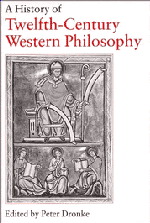Introduction
Published online by Cambridge University Press: 01 June 2011
Summary
It is an exciting moment to be looking at twelfth-century philosophy. The last thirty years have seen the discovery in manuscript of many major texts in this field, and the appearance of an imposing number of new editions and specialist studies. Many of those who have worked at first hand with the documents of twelfth-century thought have come to see the achievements in this century as among the most original and most brilliant in the whole of pre-Renaissance philosophy. Till now, however, the histories of philosophy have lagged behind. In Bernhard Geyer's medieval volume (1927) in the standard history begun by Ueberweg, the twelfth century was given some ninety pages – about one ninth of the space devoted to the Middle Ages as a whole. In the best histories available in English from the post-war period, however, the century that spans from St Anselm to Alan of Lille occupies only a twelfth of the space in Etienne Gilson's History of Christian Philosophy in the Middle Ages, and less than a fifteenth in the early medieval volume of Frederick Copleston's History of Philosophy, a volume that does not extend beyond the thirteenth century. In the recent Cambridge History of Later Medieval Philosophy, which treats the period 1100–1600, apart from a brief chapter on ‘Abelard and the Culmination of the Old Logic’, twelfth-century thought features only in incidental allusions.
- Type
- Chapter
- Information
- A History of Twelfth-Century Western Philosophy , pp. 1 - 18Publisher: Cambridge University PressPrint publication year: 1988



